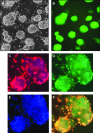De novo myocardial regeneration: advances and pitfalls
- PMID: 20695792
- PMCID: PMC2971636
- DOI: 10.1089/ars.2010.3388
De novo myocardial regeneration: advances and pitfalls
Abstract
The capability of adult tissue-derived stem cells for cardiogenesis has been extensively studied in experimental animals and clinical studies for treatment of postischemic cardiomyopathy. The less-than-anticipated improvement in the heart function in most clinical studies with skeletal myoblasts and bone marrow cells has warranted a search for alternative sources of stem cells. Despite their multilineage differentiation potential, ethical issues, teratogenicity, and tissue rejection are main obstacles in developing clinically feasible methods for embryonic stem cell transplantation into patients. A decade-long research on embryonic stem cells has paved the way for discovery of alternative approaches for generating pluripotent stem cells. Genetic manipulation of somatic cells for pluripotency genes reprograms the cells to pluripotent status. Efforts are currently focused to make reprogramming protocols safer for clinical applications of the reprogrammed cells. We summarize the advancements and complicating features of stem cell therapy and discuss the decade-and-a-half-long efforts made by stem cell researchers for moving the field from bench to the bedside as an adjunct therapy or as an alternative to the contemporary therapeutic modalities for routine clinical application. The review also provides a special focus on the advancements made in the field of somatic cell reprogramming.
Figures



References
-
- Agbulut O. Mazo M. Bressolle C. Gutierrez M. Azarnoush K. Sabbah L. Niederlander N. Abizanda G. Andreu EJ. Pelacho B. Gavira JJ. Perez-Ilzarbe M. Peyrard S. Bruneval P. Samuel JL. Soriano-Navarro M. Garcia-Verdugo JM. Hagege AA. Prosper F. Menasche P. Can bone marrow-derived multipotent adult progenitor cells regenerate infarcted myocardium? Cardiovasc Res. 2006;72:175–183. - PubMed
-
- AHA. Heart Disease and Stroke Statistics, 2009 Update. Circulation. 2009;119:e21–e181. - PubMed
-
- Aoi T. Yae K. Nakagawa M. Ichisaka T. Okita K. Takahashi K. Chiba T. Yamanaka S. Generation of pluripotent stem cells from adult mouse liver and stomach cells. Science. 2008;321:699–702. - PubMed
-
- Balsam LB. Wagers AJ. Christensen JL. Kofidis T. Weissman IL. Robbins RC. Haematopoietic stem cells adopt mature haematopoietic fates in ischaemic myocardium. Nature. 2004;428:668–673. - PubMed
-
- Bearzi C. Rota M. Hosoda T. Tillmanns J. Nascimbene A. De Angelis A. Yasuzawa-Amano S. Trofimova I. Siggins RW. Lecapitaine N. Cascapera S. Beltrami AP. D'Alessandro DA. Zias E. Quaini F. Urbanek K. Michler RE. Bolli R. Kajstura J. Leri A. Anversa P. Human cardiac stem cells. Proc Natl Acad Sci USA. 2007;104:14068–14073. - PMC - PubMed
Publication types
MeSH terms
Grants and funding
LinkOut - more resources
Full Text Sources

